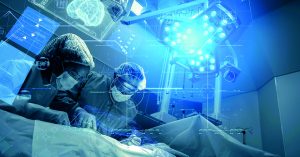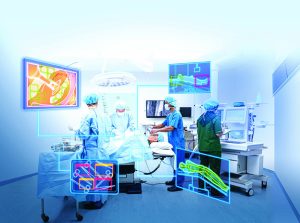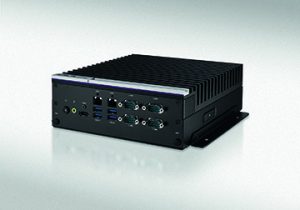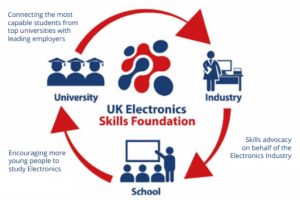
The advent of big data, machine learning (ML) and artificial intelligence (AI) has enabled medical researchers to gain deep insights by analysing vast amounts of patient data. These insights can help doctors to take better decisions, diagnose more precisely and treat patients with fewer side effects. When combined with live patient data, AI can process and analyse pre-trained models instantly. This inference of AI is opening up new possibilities for medical equipment manufacturers to create disruptive medical devices that will help to shape the future of healthcare.
AI is already reaping benefits as players have established an ecosystem for medical AI and GPUs.
According to Nvidia, accelerated computing and AI are powering next generation medical instruments and unlocking discoveries in biomedical research. It says it aims to provide solutions that simplify the development and deployment of domain-specific AI to advance research, patient care and treatment outcomes.
AI-powered advances
For example, AI is helping in drug discovery by enabling researchers to model (virtually) millions of molecules and screen hundreds of potential drugs simultaneously, reducing costs and speeding time to solution. In genomics, high performance computing has been able to accelerate genome analysis in population and cancer genomic studies, helping to identify rare diseases and bring tailored therapeutics to market faster.

In terms of medical devices, Nvidia asserts that AI-powered tools can serve as an extra set of eyes that help clinicians to detect and measure anomalies quickly, while increasing surgeons’ skills, enhancing image quality and optimising workflows. Whether it is through the use of smart sensors or advanced image processing, AI is making it possible to deliver immediate insights that are capable of realising the promise of smart hospitals.
The company also says that healthcare demands new computing paradigms to meet the need for personalised medicine, enhanced quality of care and breakthroughs in biomedical research to treat disease.
AI acceleration
Philips has been developing precision diagnosis with AI using Nvidia technologies to accelerate workflows, improve efficiency and advise on clinical and operational optimisation. Using a number of clusters equipped with different GPUs, including DGX A100, the company’s software, TensorRT and optimised CUDA (compute unified device architecture) cores, Philips has been able to scale with
demand and deliver performance improvements using AI-powered solutions for scheduling, preparation, interpretation and reporting as well as for clinical decisions and follow-up.
Medical professionals have been able to replace MRI respiratory belts, conduct patients’ CT positioning and scan planning with AI and computer vision, while also using AI models to compensate for scatter radiation in X-rays.
Embedding inference
The integration of AI technologies at the point of care is making it possible to deliver better support for patients and improved prognoses. The challenge for medical device manufacturers has been to embed complex AI models that have been tested and fine-tuned on server farms in data centres into comparatively compact pieces of equipment. Nvidia says its Jetson platform is optimised for embedded AI.
Customised AI systems
Advantech’s design and manufacturing services team has developed a range of AI solutions created specifically for use in the medical sector. These include custom-designed boards and systems as well as the customisation of existing standard products for inference solutions with efficient Jetson platforms, integration with FPGA devices or scalable workstations that combine server processors with one or multiple GPU accelerators, created, verified, validated and certified to medical standards.
To demonstrate the feasibility of using AI inference in the healthcare industry, the team has developed a medical grade edge AI box PC with up to 384 Nvidia GPU cores, CPU and a large memory subsystem for image processing and fast data processing in video endoscopy, computed tomography (CT scans) or fluorescence tomography.
Advantech, an Nvidia ecosystem partner, has based its AIR-030 edge AI box computer (pictured) on the Jetson AGX Orin.

This system includes I/O options, such as CAN bus for motion and other control, LAN with optional PoE for camera input, and digital I/O for sensor/actuators. In real-time video analytics and AI robotics applications the computer enables AI developers to boost performance by using 10GE for high-speed networking. It is supplied with an Nvidia JetPAck 5.0 software development kit.
Advantech’s DeviceOn for Edge AI package provides deployment, remote management and update capabilities, which on Nvidia platforms makes it possible to update AI inference models in bare metal as well as Docker environments. Powerful insights can be gained from remote monitoring of AI-related performance indicators such as throughput levels.
AI case studies
Inception is Nvidia’s program designed to help startups to evolve with opportunities to connect with venture capitalists and with access to the latest technical resources from the company. It offers support throughout a startup’s lifecycle, expertise via courses at the Nvidia Deep Learning Institute and access to developer forums. It also provides preferential pricing on some hardware and software. Members can receive business and marketing support from partners such as Oracle for Startups and AWS Activate.
With the support of Nvidia’s Inception project, Lunit, a South Korean medical imaging startup, created an AI-based system that is capable of detecting pneumonia in Covid-19 patients within seconds. In this application, AI was able to process vast amounts of data and discover patterns, which would, otherwise, simply not be feasible. AI also made it possible to carry out these tasks without having to spend significant amounts of time or call on valuable skilled resources.
Another Inception member, the Australia-based EMVision, was able to design a lightweight brain-scanning device using the Nvidia Jetson edge AI platform and Nvidia DGX systems. The portable scanner is for use at the point of care as well as in ambulances and enables the user to diagnose a brain stroke within minutes. This is critical because the average stroke patient will lose nearly two million neurons every minute the condition is left untreated.
The helmet-like device developed by EMVision is based on electromagnetic imaging technology. AI makes it possible to distinguish between ischaemic and haemorrhagic strokes (clots and bleeds) within the shortest possible timeframes. This fast determination could play a role in the patient’s outcome.
 Electronics Weekly Electronics Design & Components Tech News
Electronics Weekly Electronics Design & Components Tech News



